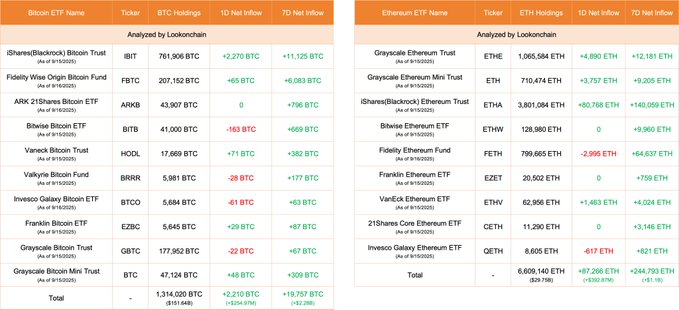- Bitcoin and Ethereum ETFs see strong institutional inflows, indicating growing market demand.
- BlackRock leads Bitcoin and Ethereum ETF growth with significant holdings and inflows.
- Institutional interest in Bitcoin and Ethereum ETFs reflects cryptocurrencies’ increasing mainstream adoption.
Bitcoin and Ethereum ETFs are seeing a strong growth in institutional inflows, signaling increased demand from large investors. As of September 16, 2025, Bitcoin ETFs reported a net inflow of +2,210 BTC (worth approximately +$254.97 million), with BlackRock’s iShares Bitcoin Trust (IBT) seeing the largest share. Ethereum ETFs also showed a large increase, with a net inflow of +87,266 ETH (around +$392.87 million). This surge in ETF demand shows the growing institutional interest in both cryptocurrencies, pointing to their deepening integration into the traditional financial markets.
Bitcoin ETF Market: A Surge in Institutional Inflows
Bitcoin ETFs have become a key investment tool for institutional players looking to gain exposure to the world’s largest cryptocurrency. BlackRock’s iShares Bitcoin Trust remains the leader in the space, holding 781,906 BTC, after a large daily inflow of 2,270 BTC. In the past week, the fund saw a 7-day inflow of 11,125 BTC, totaling $262 million.
Sept 16 Update:
10 #Bitcoin ETFs
NetFlow: +2,210 $BTC(+$254.97M)🟢#BlackRock inflows 2,270 $BTC(+$262M) and currently holds 761,906 $BTC($87.92B).9 #Ethereum ETFs
NetFlow: +87,266 $ETH(+$392.87M)🟢#BlackRock inflows 80,768 $ETH($363.62M) and currently holds 3,801,084… pic.twitter.com/6FdRkSdkEf— Lookonchain (@lookonchain) September 16, 2025
Other Bitcoin ETFs are also contributing to the overall growth in the market. The Fidelity Wise Origin Bitcoin Fund (FBTC) holds 207,539 BTC, having recorded a modest 65 BTC inflow in the past week. Meanwhile, the VanEck Bitcoin Trust (HDOL) saw a net inflow of 173 BTC, bringing its total BTC holdings to 69,397. In total, all tracked Bitcoin ETFs now hold 1,314,040 BTC, with a 10-day net inflow of 2,210 BTC, demonstrating strong institutional interest and confidence in Bitcoin as an investment.
Ethereum ETFs: Growing Investor Appetite
The Ethereum ETF sector is also attracting large institutional inflows. BlackRock’s iShares Ethereum Trust (ETHA) now holds 3,801,084 ETH, with a remarkable 140,969 ETH inflow over the last 7 days. The Grayscale Ethereum Trust (ETHE) holds 1,065,854 ETH and saw a 7-day inflow of 12,181 ETH.

Source: Lookonchain
Despite these positive figures, there was a slight outflow in one Ethereum ETF. The 21Shares Core Ethereum ETF (CETH) recorded a minor loss of 617 ETH in net inflows. However, the total Ethereum holdings across all ETFs currently stand at 6,600,140 ETH, with a net inflow of 244,793 ETH in the past week, indicating a solid demand for Ethereum exposure in the institutional market.
Bitcoin and Ethereum ETFs: Institutional Growth Continues
The growing demand for both Bitcoin and Ethereum ETFs, as reported from our previous post, points to the rising institutional interest in cryptocurrencies. These ETFs offer a regulated means for large investors to gain exposure to Bitcoin and Ethereum, assets that have seen increasing mainstream adoption. As evidenced by the strong inflows into the iShares Bitcoin Trust and iShares Ethereum Trust, Bitcoin and Ethereum continue to be seen as attractive assets for traditional financial institutions.
With total Bitcoin ETF holdings now at 1,314,040 BTC and Ethereum ETF holdings at 6,600,140 ETH, institutional demand for these digital assets is showing no signs of slowing down. The large participation from institutional players like BlackRock underlines the shift towards cryptocurrency integration within the broader financial ecosystem, suggesting that Bitcoin and Ethereum ETFs will continue to have a key role in the market’s future growth.
Stay informed with daily updates from Blockchain Magazine on Google News. Click here to follow us and mark as favorite: [Blockchain Magazine on Google News].
Disclaimer: Any post shared by a third-party agency are sponsored and Blockchain Magazine has no views on any such posts. The views and opinions expressed in this post are those of the clients and do not necessarily reflect the official policy or position of Blockchain Magazine. The information provided in this post is for informational purposes only and should not be considered as financial, investment, or professional advice. Blockchain Magazine does not endorse or promote any specific products, services, or companies mentioned in this posts. Readers are encouraged to conduct their own research and consult with a qualified professional before making any financial decisions.